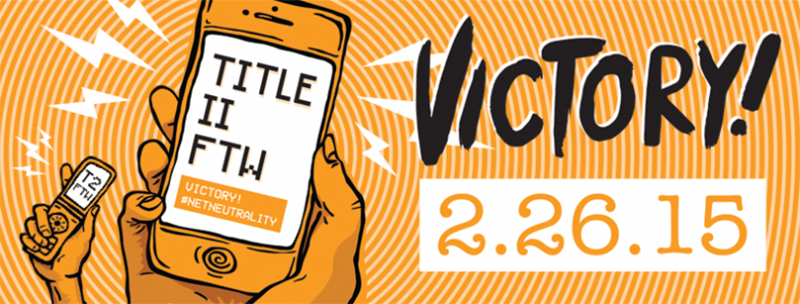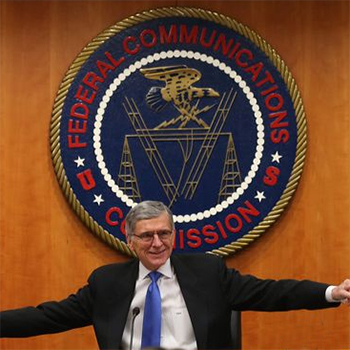FCC Votes to Protect the Internet with Title II Regulation

Title II is the FCC's strongest tool for enforcing open internet rules - A huge win for net neutrality.
Net neutrality has won at the FCC. In a 3-to-2 vote, the Federal Communications Commission today established a new Open Internet Order that implements strict net neutrality rules, including prohibitions on site and app blocking, speed throttling, and paid fast lanes.
Critically, the order also reclassifies internet providers’ offerings as telecommunications services under Title II of the Communications Act. Though this is likely to provoke a challenge in court, Title II gives the commission the tools it needs to enforce these strict rules.
This is also the first time that net neutrality rules will apply, in full, to mobile internet service. Additionally, the commission uses the new order to assert its ability to investigate and address complaints about “interconnect” agreements - deals made between internet providers like Comcast and content companies like Netflix, which has regularly complained that these deals are unfair.
The FCC’s new order establishes a standard that requires internet providers to take no actions that unreasonably interfere with or disadvantage consumers or the companies whose sites and apps they’re trying to access. At most, internet providers may slow down service only for the purpose of “reasonable network management” - not a business purpose.
This is a huge win for net neutrality advocates. Since the commission’s original net neutrality rules were struck down in court last year, advocates have been pushing for the FCC to use utility-style Title II reclassification when implementing a new order.

This morning the FCC voted to protect real Net Neutrality - marking the biggest victory for the public interest in the agency’s history.
That’s right. We won.
Even a few months ago this victory didn’t seem possible. Last May, FCC Chairman Tom Wheeler ignored the public call for real Net Neutrality - and instead released a proposal that would have allowed pay-to-play fast lanes online.
Comcast and its pals thought they’d won the fight. But Free Press members and millions of people across the country proved them wrong. After a year of relentless activism, Wheeler reversed course - moving to give Internet users the strongest protections possible under Title II of the Communications Act.
It’s an incredible turnaround that wouldn’t have happened without every single phone call, email, rally, Facebook post, tweet, meeting with Congress and everything else activists have been part of in the fight to save the Internet.
This moment was more than 10 years in the making. The fight to protect the open Internet has united everyone - grassroots activists, technologists, new civil rights leaders, parents, teachers, students, musicians, artists and millions and millions of Internet users. We’ve proven that we’re a force to be reckoned with in Washington.
Know this: Now that we’ve won this huge victory for the Internet, the cable and phone companies will do everything they can to knock it down. But Free Press has never backed down from a fight.
Whether in the courts or in Congress, the media or the streets, we will continue pushing, fighting and advocating for the strongest possible policies to protect the free and open Internet. Our message to the world is clear: Mess with the Internet, and you’ll lose.
This isn’t the end. This is the start of something huge.
Craig Aaron - Free Press
For a while, it didn’t look like that was going to happen. Commission chairman Tom Wheeler initially proposed rules that seemingly undermined the entire concept of net neutrality by allowing paid fast lanes. But earlier this month, following support from President Obama and millions of public comments spurred on by a popular John Oliver segment and advocacy from major websites like Netflix, Kickstarter, and Tumblr, Wheeler announced the dramatically overhauled new plan that was pushed through today.
“The action that we take today is an irrefutable reflection of the principle that no one, whether government or corporate, should control free and open access to the internet,” Wheeler said.
“We cannot have a two-tiered internet with fast lanes that speed the traffic of the privileged and leave the rest of us lagging behind,” commissioner Jessica Rosenworcel said at today’s meeting. “We cannot have gatekeepers who tell us what we can and cannot do and where we can and cannot go online. And we do not need blocking, throttling, and paid prioritization schemes that undermine the internet as we know it.”
Commissioner Mignon Clyburn also spoke strongly in favor of the order. “We are here because we want to give those with deep pockets and those with empty pockets the same opportunities to succeed,” she said. Clyburn notes that, while she voted in favor of the 2010 rules, today’s order is far closer to what she originally supported. Clyburn also says that a minor classification change has been made to the proposal to address one of her concerns with it - an issue that Google and Free Press both agreed with her on. That said, Clyburn says that she would have liked to see the “unreasonable discrimination rule” from the 2010 order used here instead of the unreasonably interference rule, and that isn’t being changed.
As the vote makes clear, the entire commission isn’t on board with the new rules. Both Republican commissioners, Michael O’Rielly and Ajit Pai, have expressed their disagreement with the order. Prior to the vote today, O’Rielly issued a statement arguing that the commission’s decision-making power had been usurped by the administration for political purposes. He also argues that net neutrality is unnecessary, that Title II imposes overbearing regulation, and that Title II doesn’t actually stand on solid legal footing. For comparison, he has previously drawn a line between 4K TV and interplanetary teleportation.
Pai put forward a strong dissent as well, arguing that the commission was unable to act independently. “We are flip-flopping for one reason and one reason only,” Pai said. “President Obama told us to do so.” Pai believes that implementing this order will lead to “higher broadband prices, slower broadband speeds, less broadband deployment, less innovation, and fewer options for consumers.” He also questioned the commission’s legal authority to implement the order.
The commission also brought out a number of notable advocates to speak before the vote. That included Etsy CEO Chad Dickerson, Veena Sud, an executive producer for The Killing who appeared to be speaking on behalf of Netflix, and Tim Berners-Lee, the inventor of the web. Dickerson applauded the commission for protecting the internet “as an engine for economic opportunity, the likes of which we have never seen.” Sud pointed to multiple Netflix series and cited the greater diversity you find online. Berners-Lee put his feelings quite simply: “We have to add net neutrality to a list of basic market conditions that we protect.”
The new rules should go into effect around two to three months from now, though the time will vary depending on how long it takes the commission to release the order to the Federal Register. The commissioners may still need to fix technical points in the order, which can be changed with unanimous agreement.
Though this is an important victory for net neutrality advocates, their fight is not yet over. It is almost certain that one internet provider or another will challenge the rules in court, and those proceedings could take years, leaving the future of this order uncertain. The commission’s chances in court look good, but there are a number of complications that it will likely have to address. This time, at least, the FCC is using the strongest tools that it has to implement these protections.
Check out our FCC net neutrality meeting liveblog for more!
Source: The Verge
More Supply Chain 24/7 on “Net Neutrality”
Article Topics
Smithsonian News & Resources
Google’s $300 Million Funded ‘FASTER’ Internet Cable between US and Japan Goes Live FCC Reportedly Blocking Comcast’s Bid To Take Over Time Warner Cable FCC Votes to Protect the Internet with Title II Regulation FCC Chair Tom Wheeler Hints Net Neutrality Rules Will Treat Broadband as a Utility Net Neutrality - What YOU Need TO DO, and NOW! Network Neutrality, Broadband DiscriminationLatest in Technology
Spotlight Startup: Cart.com is Reimagining Logistics Walmart and Swisslog Expand Partnership with New Texas Facility Taking Stock of Today’s Robotics Market and What the Future Holds Biden Gives Samsung $6.4 Billion For Texas Semiconductor Plants Apple Overtaken as World’s Largest Phone Seller Walmart Unleashes Autonomous Lift Trucks at Four High-Tech DCs Talking Supply Chain: Procurement and the AI revolution More Technology












